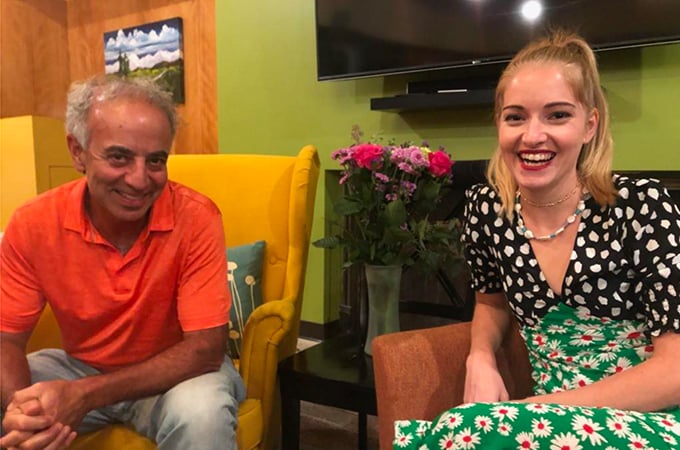Samantha “Sam” Corso ’15, whose emphasis in the Johnston Center for Integrative Studies was Performing Arts & Expressive Therapy, was an extremely active member in not only the Johnston community but the University of Redlands community as a whole. She was an active member in R.E.A.C.H. (the Read, Empower, Attain, Create, Hope program), a community intern, an actress in various stage productions, a dancer, an advocate for Johnston's internal transfers, co-founder of a sorority, and so much more. Post-graduation, Corso attended Columbia University, where she was recently awarded a master's degree in mental health counseling.
Corso spoke at Redlands last October as part of Kathryn Green Lecture Series. Here are some questions and answers from that event.
Question from Professor Tim Seiber ’04: Do you have any advice about the Johnston community?
Sam Corso ‘15: The more you put in, the more you get out. I left with such a great appreciation for [Johnston], because of how much I put into my passions. Being surrounded by lots of beautiful people constantly pushing their limits really pushed me to grow as an individual… [Grad school is] a lot less like Johnston, and more like a full-time job. I chose the “best: school and not the best school for me. Things change as you change, be easy on yourself.
Questions from Professor Julie Townsend: You took dance, psychology, and much more... How did that carry into grad school? What differentiates therapy from a friend?
Corso: It’s very intuitive. But I got so focused on the cerebral that I forgot about the entire rest of the human body. A friend will be empathetic, but a therapist will broaden your perspective on life... In order to talk about human life, you have to have a life of your own. If we [at Johnston] know anything, we know how to turn s*** into a s*** into a s*** sandwich… The “no’s” made me want to work a lot harder at what I was passionate about.
Question from Professor Fred Rabinowitz: Can you talk about your in-between college and grad school experience?
Corso: It’s important for therapists to travel—to see how different cultures work with each other. I was in a culture that wasn’t my own [in Vietnam], so I learned to avoid forcing my views on [others]. That experience gave me a unique perspective on mortality. In New York City, another culture different than my own, I had $400 [and] a couch I could sleep on, and I made it work... I encourage everyone to work in the service industry—it’s important to work with people and see how they treat other people. If you can juggle different people’s needs and address each individual, you can definitely be a good practitioner.
Question from Professor Kelly Hankin: What’s next for you?
Corso: In New York City, you need 3,000 hours of clinical work in a certain position (under a limited permit). After that, you eventually become a licensed therapist. I’m definitely looking for jobs right now. I’m looking to work in crisis intervention. I like working in systems I despise in order to make it better. It’s really rewarding. I’m also being recruited by FBI.
Learn more about the Johnston Center for Integrative Studies at the University of Redlands.
Editor’s Note: A version of this article also appeared in the Johnston Center’s Coz McNooz newsletter.






